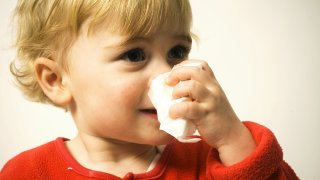
Eczema in young babies could be a sign that a child will go on to develop more allergies.
New research, published Tuesday in the journal Pediatrics, confirms a phenomenon known as the “allergic march” — a pattern that describes the way allergies tend to develop and progress in children, beginning in infancy through age 3.
The study, which analyzed medical records data collected between 1999 and 2020 from more than 200,000 children, found that kids tended to be first diagnosed with eczema, also called atopic dermatitis, at 4 months, on average. Next came diagnoses of food allergies that cause symptoms that range from hives to anaphylaxis — a life-threatening allergic reaction that affects the whole body and can cause the airways to swell and close — and asthma, both around 13 months old. At 26 months, the study found, children developed allergic rhinitis, or hay fever. In rare cases, children may go on to develop a fifth allergy, called eosinophilic esophagitis, by 35 months old.
Dr. Stanislaw Gabryszewski, a fellow in the Division of Allergy and Immunology at Children’s Hospital of Philadelphia who led the study, said the “allergic march” doesn’t mean every child who has eczema will develop every allergy described.
We're making it easier for you to find stories that matter with our new newsletter — The 4Front. Sign up here and get news that is important for you to your inbox.
“Each child is different. Some may have one, others may have a couple, others may have all of them,” he said.
Read the full story on NBCNews.com

